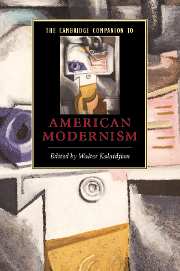8 - The avant-garde phase of American modernism
from Part II - Culture
Published online by Cambridge University Press: 28 May 2006
Summary
On June 15, 1915, a sweltering day in Manhattan, Marcel Duchamp, then twenty-eight, arrived in New York on the SS Rochambeau. “I am not going to New York, I am leaving Paris,” he announced to his American artist-patron Walter Pach. Like a number of other European avant-gardists, Duchamp was escaping the Great War - a war in which both his artist brothers, Jacques Villon and Raymond Duchamp-Villon, were already serving and in which the latter was to be killed in 1918. Duchamp himself was exempt from military service because of a heart murmur, but the very idea of war struck him as insane: “I must say,” he later told an interviewer, “I admire the attitude of combating invasion with folded arms.”
But it was not only the war that brought Duchamp to America. Increasingly, he had come to dislike the Bohemian “artistic life” of Paris, where scores of artists worked in small suburban studios vying to emulate the great Cubist painters. America, as he told an interviewer in September 1915, was different:
The capitals of the Old World have labored for hundreds of years to find that which constitutes good taste and one may say that they have found the zenith thereof. But why do people not understand what a bore this is? . . . If only America would realize that the art of Europe is finished – dead – and that America is the country of the art of the future . . . Look at the skyscrapers! Has Europe anything to show more beautiful than these?
New York is a work of art, a complete work of art . . . And I believe that the idea of demolishing old buildings, old souvenirs, is fine . . . The dead should not be permitted to be so much stronger than the living. We must learn to forget the past, to live our own lives in our own time.
(Tomkins, Duchamp, 152)- Type
- Chapter
- Information
- The Cambridge Companion to American Modernism , pp. 195 - 218Publisher: Cambridge University PressPrint publication year: 2005
- 2
- Cited by



